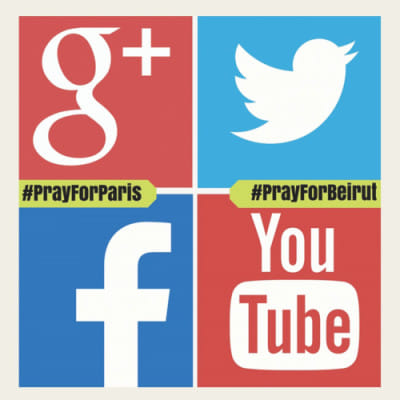THE POLITICS OF #SOLIDARITY

ON November 13, the world was struck by the tragic news of the Paris attacks. In what was the most deadly assault on French soil since WWII, at least 129 people were killed in a series of coordinated attacks while more than 400 were injured. Reactions on social media -- ranging from condolences to viewpoints on the causes of the attacks -- were quick to play out. But one of the most common criticisms was directed at the mainstream media. People questioned why the Beirut bombings that occurred a day before the Paris attacks didn't get as much coverage, even though innocent lives were lost in both instances and ISIS claimed responsibility for both. And this time around, Facebook too came under severe flak for the option of the French flag overlay on profile pictures and safety check feature for Paris, when the same options weren't made available for the people of Beirut or for the millions of Syrians who have been displaced from their homes due to the ongoing raging civil war in their homeland. The issue of the obvious selective outrage that stems from some lives being deemed more valuable than others was repeatedly raised by many, and rightfully so.
But in the age of social media where social networking sites are inundated with arguments and counter-arguments in the aftermath of such incidents by hyperactive users quick to post and share status updates often in an emotional, flustered state, such reactions serve to illuminate a number of issues. First, they not only reflect the dominant views of why people think a certain act of terrorism happened, but also help shape people's opinions, which is why it is all the more necessary that we use social media responsibly. Second (and this can be derived from the first point), these overwhelming online reactions often help expose blatant double standards and a skewed understanding of such affairs of not just the media but of social media users themselves. Third, since the popularity of opinions on social networking sites thrives on the number of 'likes', 'shares' and 'retweets' of status updates and/or articles which need not necessarily be based on facts and figures, social media can quite ironically prove to be a dangerously confusing, misleading place.
The aforementioned points hold true if you look at the reactions to the Paris attacks on social media. Putting aside some people's generalised and convenient reasonings behind the deadly attacks, what's especially problematic is the apparent 'offence' (for the lack of a better word) many took to the call for attention to the Beirut bombings. An actual status update on Facebook that read, "It's not a contest! Prayers for both Paris and Beirut" garnered much support and praise. I wonder if all those people blindly rushing to click the 'like' button on the status update, and the person who wrote it, even considered the implications of terming it a 'contest'. Since when is pointing out selective outrage akin to "competing" for sympathy? Are we to believe that the condemnation of the loss of human lives is a zero-sum game? What does mourning deaths in Beirut take away from grieving the loss of innocent lives in Paris? Can our hearts not bleed for all deaths in equal measure? #PrayForBeirut in no way means "Don't pray for Paris". It means that we need to be more inclusive in our calls for justice and show of sympathy. And as citizens of the world and as Bangladeshis, we too ought to recognise our unjust, unequal outrage and the devaluation of Hindu, Buddhist and Christian lives and of those belonging to marginalised communities here at home.
This is not to state the obvious but the convergence of all things personal and public has rendered the realm of social media volatile, unpredictable and highly politically charged. And the sharing of 'personal' opinions on a largely impersonal platform ought to be done with caution, speaking from an ethical standpoint. A generational habit of joining in on the chorus of like-minded opinions and the desperate urge to put in one's two cents on a current issue in the form of a hurriedly typed status update, no matter how untrue or insensitive, needs to be kept in check.
In an article in The Independent, Lulu Nunn astutely points out the herd mentality behind Facebook users changing their profile picture to show solidarity with Paris. Nunn questions whether this kind of online solidarity, influenced by Euro-centrism and "corporate branding initiatives" by tech giants such as Facebook, actually qualifies as true "human kindness". It is not to say that all Facebook users opting for the Tricolore are disingenuous in their solidarity. But the fact that the French flag overlay is the only single option on Facebook can be interpreted in multiple ways. Can this be seen as policing solidarity? (In other words, telling people what lives they should be mourning and worse, what lives are not worth mourning by virtue of the Syrian, Yemeni or Palestinian flag not being an option). This also speaks volumes about the ways in which corporations are quick to capitalise on such tragedies by incorporating them into clever marketing strategies that basically reduce the act of solidarity into a filtered profile picture.
In navigating the convoluted world of social media, we ought to think twice before we 'share' or 'like' a post that 'sounds right' just because 30,000 others have validated it by doing the same. Instead of hastily forming and publicly declaring an opinion on sensitive issues such as terrorism, we ought to be extra cautious about unknowingly giving credence to unsubstantiated information and baseless opinions, especially when lives are at stake (in the aftermath of the Paris attacks many began to criminalise Syrian refugees resulting in some countries tightening border control). We, as netizens, bear the responsibility to remind ourselves of the pivotal role that we play in the domain of world affairs. And in the current global atmosphere of power politics, xenophobia, terrorism and everything evil, we ought to tread the digital space with some sense of morality.
The writer is a member of the Editorial Team, The Daily Star.

 For all latest news, follow The Daily Star's Google News channel.
For all latest news, follow The Daily Star's Google News channel. 



Comments